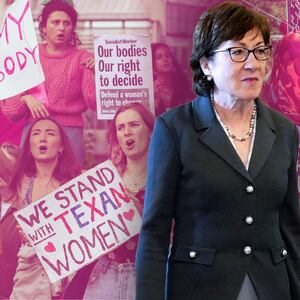This week, three Democratic lawmakers testified about their personal experiences with abortion before a congressional panel. One of those women was freshman Rep. Cori Bush, who spoke about an abortion she had after she was raped and impregnated at church camp in 1994, when she was just 17 years old. It was the first time she’d discussed the incident publicly.
“Choosing to have an abortion was the hardest decision I had ever made, but at 18 years old I knew it was the right decision for me,” she said. “To all the Black women and girls who have had abortions and will have abortions, we have nothing to be ashamed of.”
While I commend her and her House colleagues Pramila Jayapal and Barbara Lee who came forward to share stories of their own abortions, this all feels familiar.
Like in late 2020, when Sen. Gary Peters talked about his first wife’s abortion of a wanted baby with no chance of survival outside of the womb, and how draconian abortion restrictions endangered her life. “It’s important for folks to understand that these things happen to folks every day,” Peters said at the time.
Or how about during Amy Coney Barrett’s Supreme Court confirmation hearings, when Crystal Good, a West Virginia sexual abuse survivor, testified about the trauma of jumping through hoops to obtain an abortion at age 16. “Every abortion story is different, but I share my story with you to be clear that only the person who is pregnant should be making this decision, because only they know their lives and their circumstances,” she said during that testimony.
Or in 2019, when Georgia state Rep. Jen Jordan revealed that she’d had eight miscarriages in a speech against her state’s ban on abortions after the detection of a fetal heartbeat. “The only way I thought the men in that chamber would get it was to personalize it,” she said.
In 2014, Texas gubernatorial candidate Wendy Davis wrote in her book that she’d had an abortion. The year before, as a state legislator, she’d famously filibustered a strict abortion ban.
Or how about in 2013, when Gretchen Whitmer—then a Michigan state senator—shared during a legislative abortion debate that she was a survivor of sexual assault who chose abortion. “I am not enjoying talking about it—it is something I have hidden for a long time—but I think you need to see the face of the women who you are impacting with this vote today,” she said.
Or in 2011, when California Rep. Jackie Speier defended Planned Parenthood funding by speaking about her own abortion on the House floor. “I'm one of those women he spoke about just now,” Speier said of a colleague who had spoken derisively about women who seek abortions.
You get the idea. Despite all of these real human beings standing up and telling their anti-choice colleagues to their faces that abortion is a decision that must be available to women in a society that values freedom, humanity, and opportunity, nobody’s mind has been changed. It doesn’t matter how many times women who have had abortions testify to their necessity, or remind their anti-choice colleagues that they, too, are human. If anything, ignorance on the part of the anti-choice crowd has just gotten more entrenched.
Take what happened this week during the committee hearing where Bush shared her story. Republicans offered a woman of their own to provide a counterpoint: Rep. Kat Cammack. And her rebuttal also followed a familiar script.
Cammack testified that before she was born, her mother, single and facing a complicating illness, was counseled by a doctor to abort her pregnancy. However, Cammack’s mother did not have an abortion, and that high-risk pregnancy resulted in a baby that would one day to grow up to be Kat Cammack.
Cammack’s argument was a familiar entry in classic anti-choice goalpost-moving. If abortion were to remain legal and accessible to people who want it across the US, people like Cammack’s mother would still have been free to choose not to have an abortion against a doctor’s advice, just like people in situations like those of Bush, Jayapal and Lee would still be able to choose to have abortions in accordance with what they believed to be best for themselves at the time. The Democrats were not arguing in favor of forcing every pregnant woman to terminate her pregnancy. But that’s what Republicans keep arguing against.
With all due respect to Cammack, none of us would be alive to feel bad about it if our mothers had chosen abortion, or made any number of other choices in the runup to our respective conceptions. Cammack wouldn’t have existed, either, if her mother and father had not had unprotected sex within her mother’s fertile window during the month that Cammock was conceived; the egg that eventually became her would have been shed along with her mother’s period. In fact, every menstrual period every woman has over the course of her fertility is the result of one of a finite number of eggs that she carried when she was born, and each of those shed eggs could possibly have grown into a Congresswoman from Florida. Abortion is simply one of the millions of choices other people made that could have resulted in Cammack’s nonexistence. The same “I could have not existed” logic could be used to argue against the manufacture of condoms, or having a headache.
Cammack’s story would have more aptly illustrated the anti-choice argument if Cammack’s mother had been a teenage rape victim in a place where abortion is illegal, but everything turned out great as a result of the teenager being forced to carry her pregnancy to term and give birth. It also would have made more sense for that argument if it had been the former raped and impregnated teenager testifying about how glad she was that she was not given a choice, rather than an adult that owed their existence to a government-mandated pregnancy and birth.
It’s all very frustrating to witness. Disenfranchised people are often asked to defend their humanity by playing show and tell with their trauma, to un-bandage their wounds so that the people charged with apportioning out basic rights can stick their hands in and shrug. Does the re-lived trauma change any minds? Because the anti-choice side of the debate doesn’t seem to be trying as hard as they once did to convince anybody of anything.
When it comes to the complicated and deeply personal reasons women cite as their reasoning to have an abortion, conservatives know. They know women are people. They know that pregnancy and birth are more dangerous to the body than abortion, and can be physically traumatic events even for people who desperately want to be pregnant or give birth. They know that outlawing abortion will hurt women, will kill women. We’ve been telling them this for years.
They know. They just don’t care.


